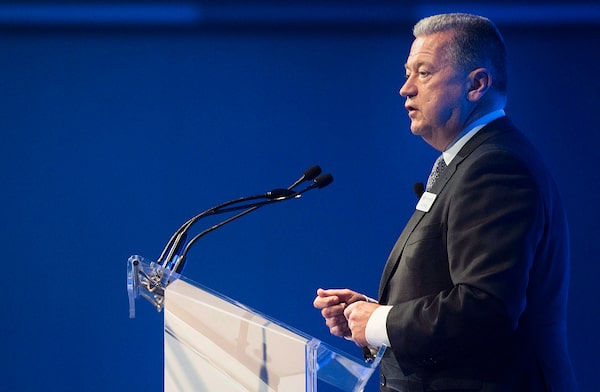
SNC-Lavalin President and CEO Neil Bruce says the legal uncertainty 'clearly affects the short-term future of the company.'Graham Hughes/Canadian Press
The chief executive of SNC-Lavalin Group Inc. says he’s worried about the company’s immediate future because of the legal uncertainty hanging over the business, but he’s not concerned about a takeover bid.
“I think [the legal uncertainty] clearly, clearly affects the short-term future of the company,” Neil Bruce said in an interview on Thursday in London, where the company has just opened a new European headquarters. “I’m not particularly worried about a takeover per se, but I am worried about the damage that these [legal] things continually do to the innocent,” he added, referring to employees and shareholders.
The Montreal-based engineering giant has been grappling with legal turmoil since last October when the Public Prosecution Service of Canada decided against negotiating a settlement, known as a deferred prosecution agreement, to resolve charges of attempted bribery and fraud. The charges were filed in 2015 and they relate to allegations SNC paid millions of dollars in bribes to officials in Libya between 2001 and 2011.
On Thursday, The Globe and Mail reported that then-justice minister Jody Wilson-Raybould faced pressure from the Prime Minister’s Office to urge federal prosecutors to change their minds but she refused to intervene. The PMO has denied directing Ms. Wilson-Raybould “to draw any conclusions on this matter.”
Prime Minister Justin Trudeau is denying that his office 'directed' former attorney general Jody Wilson-Raybould to help SNC-Lavalin avoid a criminal prosecution. The Globe and Mail never reported that officials in Mr. Trudeau’s office had directed Ms. Wilson-Raybould to take action – only that she was pressured to do so and declined.
Although SNC is very much pushing for a deferred prosecution agreement, Mr. Bruce said he was unaware of any political pressure and he didn’t comment on how the new Justice Minister, Montreal MP David Lametti, who took over last month, would handle the file.
Related: PMO pressed Wilson-Raybould to abandon prosecution of SNC-Lavalin
Opinion: Trudeau chooses not to be clear on what happened with SNC-Lavalin
“We’ve got no visibility about pressure or anything else,” he said. “We’ve no idea what goes on in the Justice Department. They don’t dialogue with us and we don’t dialogue with them.” He added that it was “really important that [the Department of Justice] or the Prosecution Service pursue the individuals responsible and at the same time try best not to do any harm to the innocent people, and innocent people being defined as employees, shareholders, pensioners.”
Quebec Premier François Legault has expressed concern that SNC could be vulnerable to a takeover because of the legal issues and, in December, he told a Montreal radio program that provincial government officials had indications of interest from foreign buyers. Mr. Bruce said the company had not received any takeover offers or approaches. “I believe that being Canadian-based, Quebec-headquartered, is a differentiator for the company.”
Mr. Bruce also sought to clarify the extent of the damage being done to the company as a result of Canada’s diplomatic feud with Saudi Arabia. That country represents around 11 per cent of SNC’s revenue and, last week, the company announced a $1.24-billion write down on its oil and gas division, mainly because of the tension between Canada and Saudi Arabia over Ottawa’s public pressure on Riyadh to release jailed dissidents.

Jody Wilson-Raybould arrives at Rideau Hall in Ottawa, on Monday, Jan. 14, 2019. The PMO has denied directing Ms. Wilson-Raybould 'to draw any conclusions on this matter.'Adrian Wyld/The Canadian Press
The announcement on Jan. 28 sent SNC’s share price down 28 per cent to $33.21 in Toronto, although the price has since recovered to around $37.
“We have not been removed from existing contracts [in Saudi Arabia]. It’s a large part of our business that continues to operate,” he said on Thursday. “What we’re seeing, and what we’ve seen recently, is a change in terms of our ability to win new work.”
He added that SNC used to win about one in three or one in four contracts that it bid on in Saudi Arabia. “That’s not happening any more. And we’ve had clear messages as well from various entities in Saudi Arabia that until the diplomatic relations are back to more normal, it’s unlikely that we will win any work.”
Related: Trudeau says he didn’t direct Wilson-Raybould on SNC-Lavalin case
Opinion: The SNC-Lavalin revelations show we are not a country bound by the rule of law
It’s unclear how long the diplomatic strain will continue, but Mr. Bruce is hopeful the Saudis won’t punish the company in the long term. “I don’t think they’d hold a grudge. I just think they’re looking for a return to more normal intergovernment relations.”
He also confirmed the company is struggling with cost overruns involving the construction of two sulfuric acid plants for Chile’s state mining company Codelco. He had declined to identify the project last week when the trouble was first disclosed by SNC, although analysts suspected it was Codelco. “We are confident that it is an isolated case,” he said without providing details. “Unacceptable, but an isolated case.”
Mr. Bruce has been in London this week to open SNC’s new European head office. That’s something of a departure for many international companies that have been pulling out of Britain over fears about Brexit. Mr. Bruce said the company had been planning a London office ever since it bought British engineering firm WS Atkins PLC in 2017 for $3.6-billion.
SNC now has 10,000 employees in Britain including 1,200 in central London. Mr. Bruce added that Brexit won’t have much of an impact on SNC because most projects across Europe are run locally and the company doesn’t have many cross-border services that could be impacted once Britain leaves the European Union.
“We’re fairly confident that in the round we’ll see modest growth through this period, not a decline. We think 2-per-cent or 3-per-cent growth looks like the forecast for the work that we’re doing in the U.K.”
 Paul Waldie
Paul Waldie